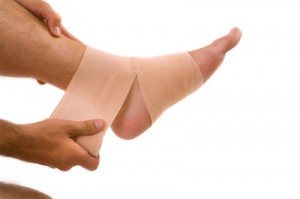 As a Grand Rapids chiropractor, I not only know why you may have foot pain, but I understand how to treat it to bring about lasting pain relief. We all know that movement is good for the whole body, right? From our head to our toes, our good health is determined by how much physical activity we get on a regular basis. So, why do so many people suffer from aches and pains in their feet? After all, aren’t our feet made for walking? Yes, but they weren’t designed for abuse.
As a Grand Rapids chiropractor, I not only know why you may have foot pain, but I understand how to treat it to bring about lasting pain relief. We all know that movement is good for the whole body, right? From our head to our toes, our good health is determined by how much physical activity we get on a regular basis. So, why do so many people suffer from aches and pains in their feet? After all, aren’t our feet made for walking? Yes, but they weren’t designed for abuse.
The average, healthy person takes 3,000-5,000 steps each day, not including activities such as running and aerobic exercise. But, often those steps are made by people walking incorrectly, with poor gait patterns and bad posture. In addition, a large number of people wear badly-designed, poorly-fitting shoes. Moving the body through space incorrectly on feet that are inhibited from functioning correctly cannot help but to cause aches and pains not only in a number of places in our feet, but in other parts of our body. For example, if an individual over-pronates (walks like a duck) in a pair of poorly made or unevenly-worn shoes, or in a pair of high heels, that person is not only likely to develop foot and ankle problems, but will probably experience problems of the back, knees and legs.
One of the most common foot problems is Plantar Fascitis (heel pain), which is usually caused by inflammation of the plantar fascia. The plantar fascia is a wonderful, multi-tasking band of connective tissue that encircles the muscles on the bottom of the foot, adheres the heel bone to the ball of the foot, supports the arch, protects the foot, and absorbs shock.
There are many factors that contribute to the development of Plantar Fascitis. One such factor is short and tight calf muscles. When calf muscles get short and tight they exert a strong pull on the back of the heel bone, producing undue stress on the smaller and weaker plantar muscles and fascia. How do calf muscles get short and tight? In addition to running and jumping activities such as aerobics, volleyball, running, basketball, and tennis, the wearing of high heels can cause the problem.
Other factors that contribute to Plantar Fascitis include sudden strenuous activity after a period of prolonged inactivity, abnormal walking patterns (such as over-pronation), improper footwear, walking on hard or uneven surfaces (especially barefooted), and obesity.
Once an individual develops Plantar Fascitis, the condition is frequently not easy to manage and can become intensely painful and persistent. If you are suffering from heel pain, your chiropractor will be able to determine the cause of your problem and what chiropractic management is best suited. Such care might include ultrasound therapy, laser, joint manipulation, muscle stretching and strengthening exercises, special taping and, in some cases, orthotics.
Call our Grand Rapids chiropractic office today. Don’t walk another step in pain!
